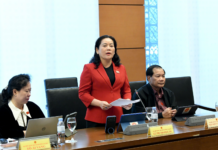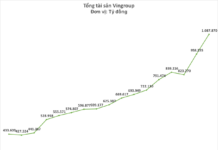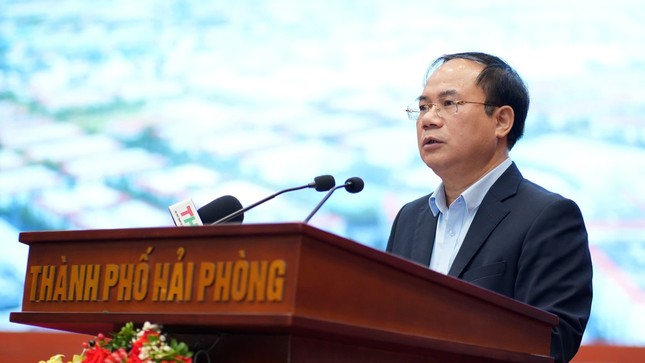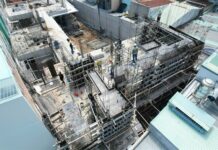Speaking at the workshop “Hai Phong – A Bright Spot in Social Housing Development” held by Tien Phong Newspaper on the morning of August 16, Deputy Minister of Construction Nguyen Van Sinh appreciated the newspaper’s initiative to organize the event at this significant time when important laws such as the Land Law, Housing Law, Real Estate Business Law, and Credit Institutions Law have taken effect, providing a crucial foundation for promoting housing projects and the real estate market, including social housing.
Mr. Sinh emphasized the great attention given by the Party, State, Government, and National Assembly to the development of social housing. The Government has issued a scheme to invest in at least 1 million social housing units by 2030. These are essential bases for local authorities and businesses to address housing needs, especially for workers, laborers, and low-income people.
Deputy Minister Sinh also pointed out the existing obstacles and difficulties in developing social housing, especially regarding institutions, which affect the progress of local authorities and investors. The legal system has witnessed notable improvements and positive changes over time.
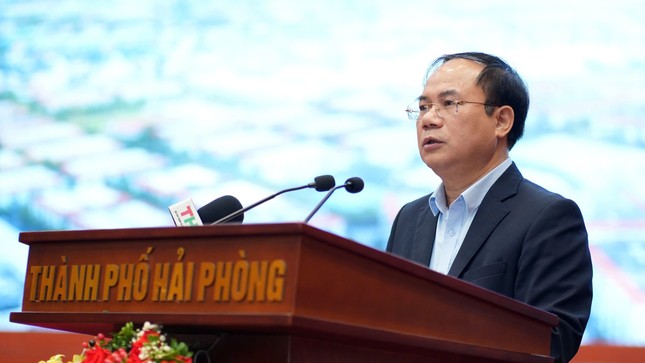
Deputy Minister of Construction Nguyen Van Sinh delivers a speech at the workshop.
Specifically, the new legal framework has institutionalized the Party and State’s guidelines and policies on housing, especially for low-income earners. Secondly, the laws have resolved some contradictory and inconsistent issues. Thirdly, there has been an enhancement in decentralization in project implementation. Fourthly, administrative procedures related to project deployment have been reformed. And lastly, the regulations have become clearer, with many innovative provisions on project investment procedures, facilitating local authorities in approval processes and businesses in project execution.
Along with this, several policies on social housing development have been given attention and refined for clarity. In particular, the People’s Committees of localities have been assigned to allocate sufficient land funds for social housing development based on local demands. There is also flexibility in allocating land funds within commercial projects for social housing, with options for land swaps or monetary compensation. The Housing Law clearly defines the stages and procedures for investing in social housing. It also provides explicit and consistent regulations on selecting investors, aligning with the Bidding Law, and introducing various policies that combine the approval of policies and the recognition of investors.
The policies offer more attractive and explicit incentives for investors, including exemption from land use fees and the elimination of land price determination procedures, which helps shorten the process by 6-12 months. The conditions for purchasing social housing have been simplified, and the selling and rental prices are calculated to accurately reflect the construction costs incurred by the businesses.
“These innovations will be popularized among enterprises so that they can grasp and quickly implement their projects,” said Mr. Sinh.
Deputy Minister Sinh emphasized that many localities have actively promoted real estate projects, including social housing. Hai Phong is a bright example, highly appreciated for its strong leadership and implementation. “According to the Government’s scheme, Hai Phong is expected to develop 33,400 social housing units by 2030. The city reported that it would achieve 15,400 units by 2025, and this number may even exceed the target by 2030,” Mr. Sinh added.
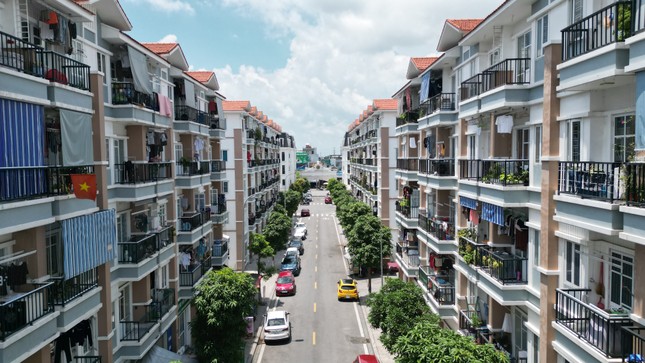
Social Housing Project in An Dong, Hai Phong.
Evaluating Hai Phong’s “bright spot” in social housing development, Mr. Sinh acknowledged the city’s dedication to allocating land funds for social housing and its attention to prime locations within the city center. These sites are already equipped with technical and social infrastructure. The city has also been proactive in reforming administrative procedures, with active participation from various departments and sectors in implementing the scheme. Many projects have been quickly approved, appraised, and deployed, ensuring legal compliance. The city has also successfully selected capable investors who can execute projects promptly and with high quality. Some projects even surpass commercial housing in terms of quality.
Deputy Minister Sinh expressed his hope that the city would continue to build on its achievements, expecting it to soon accomplish its social housing development goals. He also encouraged the city to maintain transparency in the sale of social housing and accelerate the progress of ongoing projects.
In recent years, the development of social housing has yielded positive initial results. As of now, there are 619 social housing projects implemented nationwide, with a scale of 561,816 units. Among these, 79 projects with 40,679 units have been completed. Additionally, 128 projects with 111,688 units have been licensed and started construction, and 412 projects with 409,449 units have been approved in principle.
Easier mortgage interest rates
Starting from the beginning of the year, banks have been implementing various low-interest credit packages, offering loans to pay off debts from other banks… with the aim of stimulating the demand for home loans.
Removing Land Policy Bottlenecks, Creating New Resources for Development
The passing of the Land Law by the National Assembly has been well-received by society, with expectations that policy barriers and bottlenecks will be quickly dismantled and eliminated. This will effectively utilize land resources, contributing to the creation of new resources that will promote socio-economic development…










